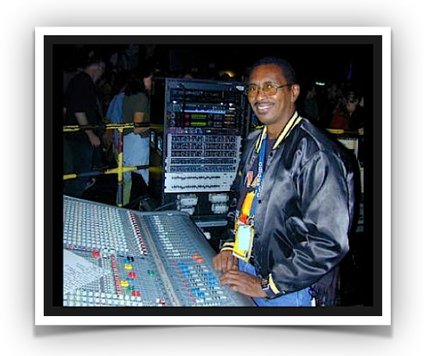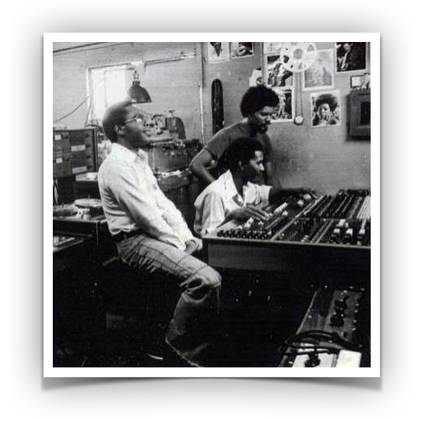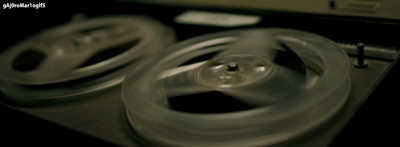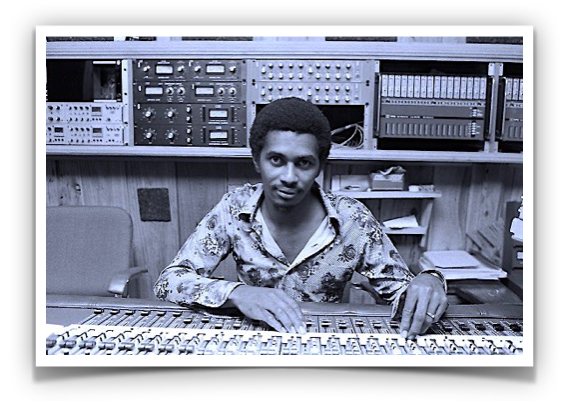The Errol Brown Q&A
Errol Brown is an iconic engineer and producer, and we are honored to have him as our Executive Producer!
With over 370 music credits to his name and 6 Grammy Awards
Errol Brown produced the "Legend" album with Bob Marley, the highest selling
reggae album of all time with over 30+ Million copies sold globally.
Here is Errol Brown's complete list of music credits:
http://www.allmusic.com/artist/errol-brown-mn0000805522/credits
With over 370 music credits to his name and 6 Grammy Awards
Errol Brown produced the "Legend" album with Bob Marley, the highest selling
reggae album of all time with over 30+ Million copies sold globally.
Here is Errol Brown's complete list of music credits:
http://www.allmusic.com/artist/errol-brown-mn0000805522/credits
|
Written by Scott Brown
Station Director, Co-founder • Big Reggae Mix • We sat down with Errol Brown over Skype and in-person to discuss various aspects of his career. Mr. Brown brings a great deal of depth and experience to our team at BigReggaeMix.com. SB: Describe what you do Brother Errol. EB: I am a Sound Recording & Mixing Engineer, plus a Producer. SB: When did you start Sound Engineering and Producing? EB: I started in the business in the early 70's at my Uncle’s “Treasure Isle Recording Studio” and his name was Duke Reid. SB: Who trained you? EB: I started training by a Engineer name Byron Smith. My training was completed by my uncle Duke Reid, which was a serious drilling, it wasn’t easy. |
|
SB: How was sound engineering different when you started, compared to now?
EB: When I started it was really hard because you have to record everything one time, it's like mixing a song now, the balance had to be accurate, because those days the recording machine was 1-track, then 2-Tracks, then 4-Tracks, then 8-Tracks, then 16-Tracks, then 24-Tracks, then 48-Tracks, now unlimited tracks. No fixing or correcting when I started, unlike today's world, every instrument is on a separate track, so you can take out, or replace any mistake, I know it's strange but I love the digital world we are in today, the sound it's just perfect, no tape hiss, no scratchy records, so better separation, what you record is what you hear when you play back. In the early days I would have to align the tape machines to get the best quality, and you don't care how perfect you aligned these machines, the bass drum and the bass guitar would come back very heavy. I personally didn't like that, I always want to get back the sound I put on tape, I know the American Engineers love that, always talking about warmth you get from tape (that you don't get from the digital world but it definitely does not bother me. Love it. Ha ha! |
|
SB: Errol, you said when we spoke that you love digital and would never go back to analog, can you expand on this a bit?
EB: That's exactly what I mean. How much do I love the digital world? My answer: “ No more tape machines.″ Please do not misunderstand me, I do all of my recording through Analog Consoles and outboard gears, equalized how I like the drum and bass to sound. After that I record it in protocols and also mix in protocols (In The Box). SB: When did you start working for Bob Marley? EB: I started to work for Bob Marley when I left Treasure Isle Studios. SB: Do you remember the first time you met him? EB: I definitely remember - in the record shop at 56 Hope Road. It was really Marcia Griffiths who took me there. I was her personal engineer in those days. SB: What was your first impression? EB: Well I wasn't scared, because I was and still am not “star struck.″ It was just like meeting a regular person, and that's the way he was in any case, what got me frightened was when he took me in the studio and lifted the cover off the MCI Recording and Mixing Console. It was really frightening - imagine I'm coming off a very simple 12 Channel console and buck up this 36 State of The Art Console, didn't know if I could do it but I got brave and challenged and conquered it. SB: How did your professional relationship with Bob Marley and the Wailers happen? EB: Marcia Griffiths usually bragged about her Engineer to them, and he (Bob Marley) told her he wanted to meet me, so that is how it happened although he really met me at Treasure Isle Studio when Peter Tosh rented the studio to do the “Legalize It″ album with the Wailers. He was there with Peter through the recording, so I guess he was listening from them. SB: Which albums did you work on with Bob? What songs did you produce? EB: The first album at Tuff Gong Studios was “Survival.″ I was assistant Engineer to Alex Sadkin and of course I learned a lot from him. The next album was “Uprising.″ I recorded and mixed “Confrontation.″ I recorded, mixed and produced along with Bob Marley and the Wailers. "Legend" was a mixture of some of my mixes. SB: Were there any songs you worked on, while you were making them that you knew would be big? Which ones? EB: Definitely “Could You Be Loved.″ It had a disco Reggae feel (we could say a crossover feel) and it really did work. It really broke Bob Marley & The Wailers big in the USA, from then everyone in the USA started to pay more attention to his songs. |
|
SB: What was it like to produce a song like “Redemption Song″ and to tour and hear massive crowds sing along after so many years?
EB: I think it is and will always be a classic. I must say thanks to Chris Blackwell. We were struggling all day with the band to get the right feel for the song, and in the afternoon he walked in the studio, listened and then pressed the talk back and said to Bob “A song like this I see just you and acoustic guitar doing it.″ Bob looked up and asked “Yeah?″ Next he just records it the way Chris Blackwell suggested and it will always be a Bob Marley classic track. So you see Bob didn't have any ego, he was humble and down to earth with everyone. |
|
SB: What inspired that song?
EB: Only Bob could answer that question, you know he really is a prophet, listen to the lyrics. SB: Do you like being someone who a lot of people don't really know “who you are” but having made such a big impact in reggae music? EB: You know something the whole world knows about the engineer/producer Errol Brown, but there are a lot of people who see me on stage and at the mixing console, but if no one don't say they don't know it's me, I think because I don't look my age sometimes these engineers keep messing with my sound and get me angry, then they know who I am, I never brag about myself until they interfere with my sound; these engineers not using their ears, they are using their eyes and looking at meters. That is so messed up! SB: What were Bob Marley and the Wailers like in the studio? EB: Lots of ganja and just doing what they did best, “Creating.” SB: Do you have any memories of working with them in the studio that stand out? EB: Just being there to be a part of their creation, that never leaves me. |
|
SB: Was the band the same on tour as they were in the studio?
EB: On tour there were tensions and excitement, touring is hard you know, no one wants to make mistakes, they just want it perfect all the time. SB: What are some stand out memories you have touring with Bob Marley and the Wailers? EB: My greatest memory is when we performed in Italy in front of 100,000 people, and to be a part of this, I just can't explain. |
|
SB: You mentioned when we spoke that you were with Bob Marley on his final Uprising tour.
Did you find the vibe different than any other tours? EB: My first concert with Bob was when we went to Zimbabwe's Independence Concert. My first tour with him was Uprising, before I was left in the studio doing what I do best. Ha!! SB: Did you know when you met Bob Marley and the Wailers that you were working with legends? EB: I realized this when I started touring with them, seeing huge audiences and the energy on the stage. SB: Can you describe what you did between the time Bob Marley passed to working with Rebelution? EB: Before and after Bob passed I was working with Rita Marley and the Melody Makers in the studio, so then we started touring with Ziggy Marley from then. After that it was on to working with Rebelution. |
Rebelution
with Errol Brown at the mixing board
Live at SDSU on August 7, 2014
|
SB: Why did you start working with Rebelution?
EB: A friend hooked me up with Rebelution when they were looking for an Engineer to tour, so when Ziggy was busy I would join them, loved the energy of their music and lyrics. After awhile they wanted a full time Engineer to have a consistent sound, was trying to hook them up with my son Shane Brown, who have my sound, but he don't like long tours because he is in Artist Management and producing so he had to stick to business -- so Ziggy Marley took a long break which was not healthy to my pocket...and I decided to move on. It was time to move on and their music puts energy in my life and career, rock mixing Reggae, always wanted to do some rock mixing, so now it is even better, rock mixing with Reggae. I think Rebelution is going to put Reggae music back up there. Right now Rebelution has a huge audience and fans, you can hear them singing along, it makes me so happy. SB: You've won two Grammys for "Best Reggae Album" with Ziggy Marley and Stephen Marley, did you expect to win? EB: Well, it's really 5 Grammys under my belt, but you know how I am, I don't expect, always leave everything to God, he will give me rewards where it is due. |
|
SB: Errol, you had mentioned when we spoke that you have known Ziggy and Stephen since they were kids in diapers. What were they like as kids?
EB: They had fun always playing in the Studio, their Father always asked me to keep them out, don't want them to break anything. Ha ha! SB: Do you think Reggae's popularity has risen, stayed the same or dropped since Bob Marley? Why? EB: I think Dancehall music was stifling the good music, and dancehall don't draw a huge audience worldwide, but it's all good, it is coming alive again. SB: You said you like touring more than producing, why is that? EB: I usually please musicians and singers in the studio, now I get to please musicians, singers and the audience, so it gives me much happiness. SB: Will you be touring until the end? EB: Until God decides. |



